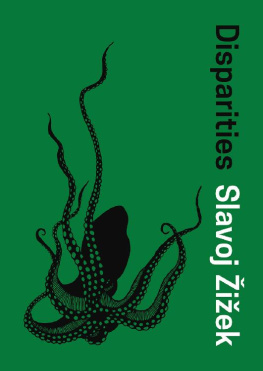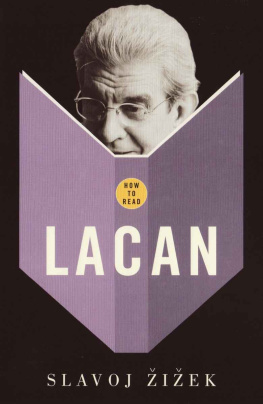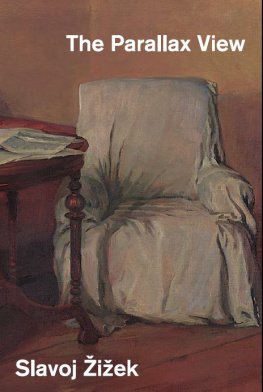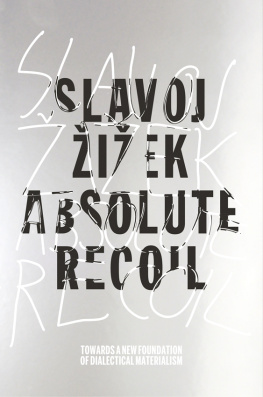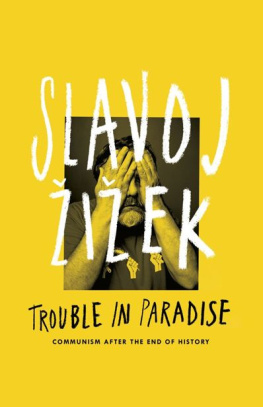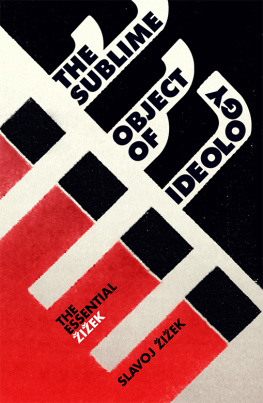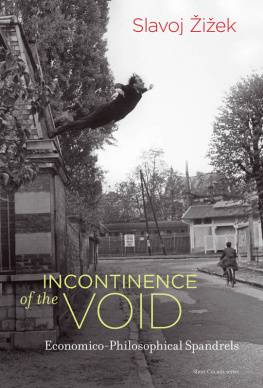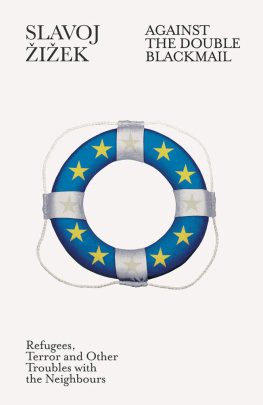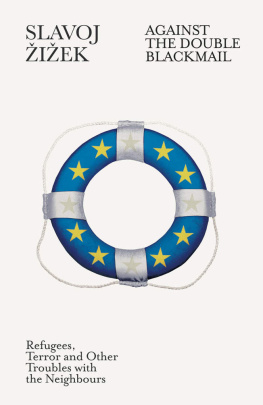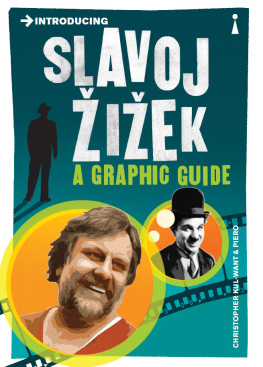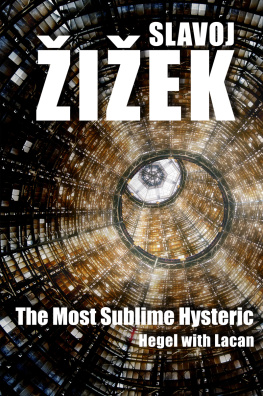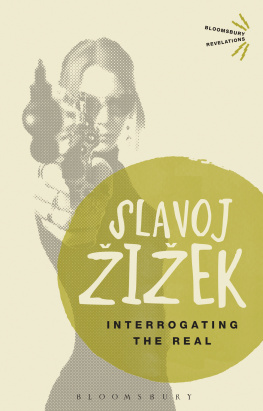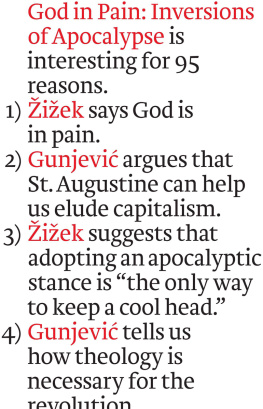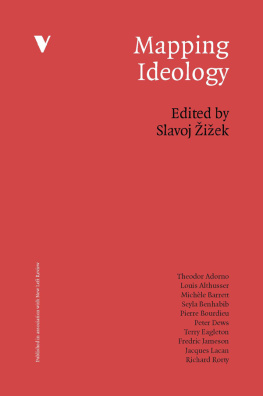VIOLENCE
As always, he combines the fruitfully combative, the densely intelligent, and the merely glib, sometimes in the same paragraph. Guardian
An exhilarating, unsettling read Dubliner
His prose is dense but never foggy, graced by a wealth of jokes and anecdotes Arena
Violence is nothing if not an exciting read; provocative ideas abound on every page. Philosophy magazine
ieks thoughtfully provocative book examines violence, treating the reader to an enjoyable and dazzling display of intellectual pyrotechnics. Jewish Chronicle
His diagnosis of this ideology is quite delightful, producing counter-intuitive analyses that overturn what passes for common sense. Independent
ieks thoughts on such a difficult subject show him to be a serious, innovative and original thinker. Tribune
SLAVOJ IEK is a Slovenian sociologist, postmodern philosopher and cultural critic. He is the author of over forty books and the subject of two major films: The Perverts Guide to Cinema and iek! In 1990 he ran for Presidency of the Republic of Slovenia and is currently the international director of the Centre for Advanced Studies in the Humanities at Birkbeck.
BIG IDEAS
General editor: Lisa Appignanesi
As the twenty-first century moves through its tumultuous first decade, we need to think about our world afresh. Its time to revisit not only politics, but our passions and reoccupations, and our ways of seeing the world. The Big Ideas series challenges people who think about these subjects to think in public, where sound bites and polemics too often provide sound and fury but little light. These books will stir debate and continue to be important reading for years to come.
Other titles in the series include:
Julian Baggini | Complaint |
Jenny Diski | The Sixties |
Paul Ginsborg | Democracy |
Ian Hacking | Identity |
Eva Hoffman | Critical Time |
Steven Lukes | Moral Relativism |
Susie Orbach | Bodies |
Renata Salecl | Tyranny of Choice |
VIOLENCE
SIX SIDEWAYS REFLECTIONS
Slavoj iek

This paperback edition published in 2009
First published in Great Britain in 2008 by
PROFILE BOOKS LTD
3A Exmouth House
Pine Street
London EC1R 0JH
www.profilebooks.com
Copyright Slavoj iek, 2008, 2009
1 3 5 7 9 10 8 6 4 2
Typeset in Minion by MacGuru Ltd
info@macguru.org.uk
Printed and bound in Great Britain by
Bookmarque Ltd, Croydon, Surrey
The moral right of the author has been asserted.
All rights reserved. Without limiting the rights under copyright reserved above, no part of this publication may be reproduced, stored or introduced into a retrieval system, or transmitted, in any form or by any means (electronic, mechanical, photocopying, recording or otherwise), without the prior written permission of both the copyright owner and the publisher of this book.
A CIP catalogue record for this book is available from the British Library.
ISBN 978 1 84668 027 4

INTRODUCTION
THE TYRANTS BLOODY ROBE
There is an old story about a worker suspected of stealing: every evening, as he leaves the factory, the wheelbarrow he rolls in front of him is carefully inspected. The guards can find nothing. It is always empty. Finally, the penny drops: what the worker is stealing are the wheelbarrows themselves
If there is a unifying thesis that runs through the bric-abrac of reflections on violence that follow, it is that a similar paradox holds true for violence. At the forefront of our minds, the obvious signals of violence are acts of crime and terror, civil unrest, international conflict. But we should learn to step back, to disentangle ourselves from the fascinating lure of this directly visible subjective violence, violence performed by a clearly identifiable agent. We need to perceive the contours of the background which generates such outbursts. A step back enables us to identify a violence that sustains our very efforts to fight violence and to promote tolerance.
This is the starting point, perhaps even the axiom, of the present book: subjective violence is just the most visible portion of a triumvirate that also includes two objective kinds of violence. First, there is a symbolic violence embodied in language and its forms, what Heidegger would call our house of being. As we shall see later, this violence is not only at work in the obvious and extensively studied cases of incitement and of the relations of social domination reproduced in our habitual speech forms: there is a more fundamental form of violence still that pertains to language as such, to its imposition of a certain universe of meaning. Second, there is what I call systemic violence, or the often catastrophic consequences of the smooth functioning of our economic and political systems.
The catch is that subjective and objective violence cannot be perceived from the same standpoint: subjective violence is experienced as such against the background of a non-violent zero level. It is seen as a perturbation of the normal, peaceful state of things. However, objective violence is precisely the violence inherent to this normal state of things. Objective violence is invisible since it sustains the very zero-level standard against which we perceive something as subjectively violent. Systemic violence is thus something like the notorious dark matter of physics, the counterpart to an all-too-visible subjective violence. It may be invisible, but it has to be taken into account if one is to make sense of what otherwise seem to be irrational explosions of subjective violence.
When the media bombard us with those humanitarian crises which seem constantly to pop up all over the world, one should always bear in mind that a particular crisis only explodes into media visibility as the result of a complex struggle. Properly humanitarian considerations as a rule play a less important role here than cultural, ideologico-political and economic considerations. The cover story of Time magazine on 5 June 2006, for example, was the Deadliest War in the World. This offered detailed documentation on how around 4 million people died in the Democratic Republic of Congo as the result of political violence over the last decade. None of the usual humanitarian uproar followed, just a couple of readers letters as if some kind of filtering mechanism blocked this news from achieving its full impact in our symbolic space. To put it cynically, Time picked the wrong victim in the struggle for hegemony in suffering. It should have stuck to the list of usual suspects: Muslim women and their plight, or the families of 9/11 victims and how they have coped with their losses. The Congo today has effectively re-emerged as a Conradean heart of darkness. No one dares to confront it head on. The death of a West Bank Palestinian child, not to mention an Israeli or an American, is mediatically worth thousands of times more than the death of a nameless Congolese.
Next page

